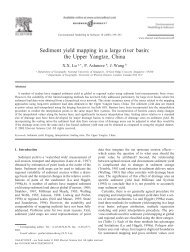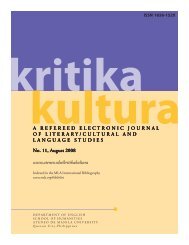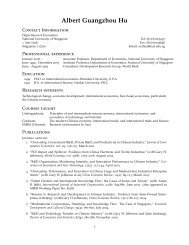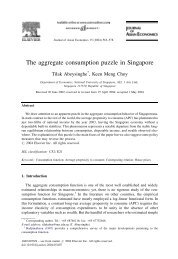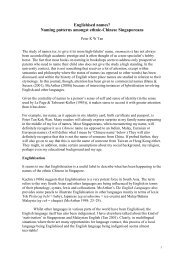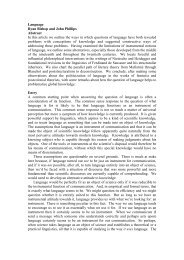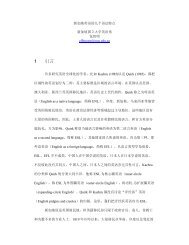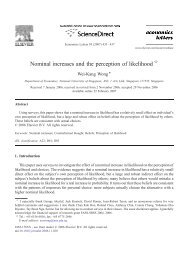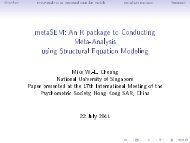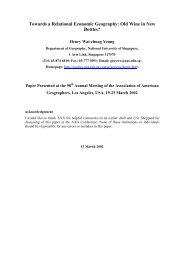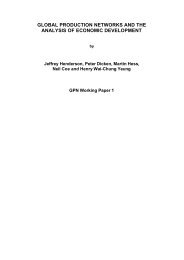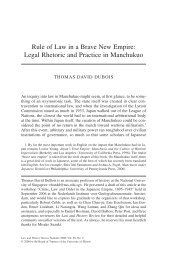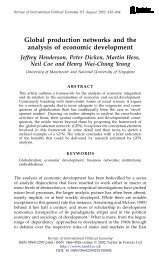Researching Hybridity in Social and Economic ... - NUS Home
Researching Hybridity in Social and Economic ... - NUS Home
Researching Hybridity in Social and Economic ... - NUS Home
You also want an ePaper? Increase the reach of your titles
YUMPU automatically turns print PDFs into web optimized ePapers that Google loves.
My argument on Ch<strong>in</strong>ese capitalism thus complements Hamilton’s (1999: 4) idea that<br />
“capitalism is not a stable <strong>and</strong> readily identifiable configuration that, like a flower, suddenly<br />
bursts forth <strong>in</strong> bloom. Instead, capitalism is merely a term that covers an extremely wide<br />
range of diverse economic activities organized <strong>in</strong> the context of competitive markets <strong>and</strong><br />
whose <strong>in</strong>stitutional conditions <strong>in</strong>clude private ownership <strong>and</strong> non-state decision mak<strong>in</strong>g”. It<br />
also supports Storper <strong>and</strong> Salais’s (1997) idea of the economy as a hybrid object constituted<br />
through a diversity of conventions <strong>and</strong> worlds of production <strong>in</strong> which actors organize <strong>and</strong><br />
legitimize their action <strong>and</strong> behaviour. The concept of culture <strong>in</strong> Ch<strong>in</strong>ese capitalism, for<br />
example, needs to be reconceptualized as a repertoire of historically cont<strong>in</strong>gent <strong>and</strong><br />
geographically specific practices that respond <strong>and</strong> adapt to chang<strong>in</strong>g local, regional <strong>and</strong> global<br />
circumstances rather than as permanently fixed mental <strong>and</strong> organizational structures that resist<br />
challenges <strong>and</strong> pressures to change (see also Hwang, 1987; Yang, 1994; 2002). Largely due to<br />
this reflexive th<strong>in</strong>k<strong>in</strong>g on the “culturalist” perspective on Ch<strong>in</strong>ese capitalism, my recent<br />
theoretical <strong>and</strong> empirical research has focused on how Ch<strong>in</strong>ese capitalism <strong>and</strong> its core feature<br />
– the Ch<strong>in</strong>ese family firm <strong>and</strong> its bus<strong>in</strong>ess networks – may change <strong>and</strong> evolve, <strong>and</strong> what<br />
accounts for the underly<strong>in</strong>g processes of these changes.<br />
This more dynamic approach is necessary because Ch<strong>in</strong>ese capitalism is not a k<strong>in</strong>d of<br />
cultural artefact that is forever cast <strong>in</strong> stones. Rather, Ch<strong>in</strong>ese capitalism is lived as a peculiar<br />
set of spatial-temporal outcomes, is highly <strong>in</strong>stitutionalized, <strong>and</strong> consists of immense<br />
struggles <strong>and</strong> contestations by social actors through discursive strategies <strong>and</strong> material<br />
practices (of which I seem<strong>in</strong>gly play a small role through my research <strong>and</strong> writ<strong>in</strong>gs).<br />
<strong>Research<strong>in</strong>g</strong> the transformative processes of Ch<strong>in</strong>ese capitalism, I have realized the<br />
importance of focus<strong>in</strong>g on these key social actors. This approach requires us to focus not so<br />
much on the cultural systems of beliefs <strong>and</strong> values <strong>in</strong> Ch<strong>in</strong>ese capitalism, but rather on how<br />
key actors perform their social <strong>and</strong> economic imperatives <strong>in</strong> real life such that their collective<br />
10



